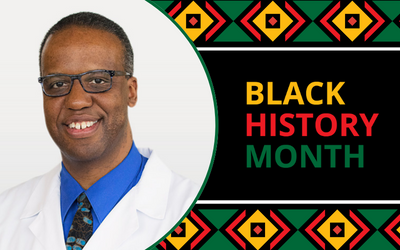Black History Month Spotlight: Edward Leonard, MD
February is Black History Month, a time to celebrate and honor the traditions, history, perspectives and contributions of all Black Americans. In honor of this month and the year-round contributions of our Black team members, we spoke with Overlake Infectious Disease Specialist Edward Leonard, MD, to hear his reflections on Black identity, diversity in healthcare, and how representation improves patient outcomes.

What does your Black/African/African American heritage mean to you?
It provides me a sense of pride to be a part of this community. Knowing that our history and culture have helped enrich the tapestry of the United States is awe-inspiring and wonderful.
Is there something you wish people knew more about your culture or racial identity?
Although we may have different approaches to life, we are similar to all people and want the same things that others do in society, such as the ability to be educated, pursue a successful career, and derive true joy from life.
Why do you think diversity and inclusion in the healthcare workforce are important?
The most important aspect of diversity and inclusion in healthcare is the ability for patients to have a provider who looks similar to them and has similar life experiences to be able to help them in their healthcare journey. I have personally experienced patients I have taken care of who have felt better about their healthcare experiences and have a more positive outlook in taking care of their health, knowing that I have been with them to assist in obtaining good health.
How do greater diversity and inclusion affect the patient experience?
Since inequities in healthcare are a public health problem for minority populations, having providers that look like them and have similar background experiences makes it easier for these patients to enter the healthcare arena and feel comfortable that their needs will be met and cared for.
What led you to pursue a career in healthcare?
I always had an interest in science growing up and around junior high school, I developed an interest in helping people. This led to the idea in my mind of marrying these two concepts together and going into medicine.
Who was/were your inspiration(s) as you were building your career?
I was inspired by many Black physicians in history I read about, such as Charles Drew, who helped identify blood types and the whole concept of blood banking and blood transfusions. As I was growing up, I volunteered at a local hospital in Akron, Ohio. During that time, I met a Black urology resident who became my mentor and guided me through the process of getting into medical school.
When you reflect on your career, what moment are you most proud of?
My greatest pride in my medical career is generally providing care for patients when they are sick and seeing them get better and back to their baseline health.
What are your views regarding health disparities among Black Americans? What more could be done to address some of these issues?
The health disparities that Black Americans face are a public health problem. These disparities can generally lead to increased stress, which can lead to issues such as worsening diabetes, heart disease, high blood pressure, as well as strokes and kidney problems. Black Americans also have higher rates of dying from treatable malignancies partly due to delays in treatment and the relative inability to have access to the therapies needed for these cancers.









